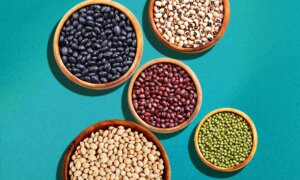Breakfast is the key to refueling your energy for the day. Although studies show that skipping breakfast may increase the risk of cardiovascular disease, some people prefer to combine breakfast and lunch into brunch. Others prefer fasting therapy for weight control without eating breakfast. Which way is best?
Dr. Zhu Yizhi from Taiwan Ming Yue Traditional Chinese Medicine Clinic proposed seven guidelines for “fat-reducing” breakfasting.
Zhu said that in addition to obtaining nutrients, the gastrointestinal system can transport them to the liver for metabolism and then distribute them to various organs through blood flow. Skipping breakfast can lead to insufficient nutrients in the blood, which may weaken the coordination between the various systems of the body and affect cardiovascular health in the long run.
Zhu believes that if we want to lose weight in a healthy way and maintain normal bodily functions, breakfast is crucial. He proposed seven principles on which we can enjoy breakfast without the fear of gaining weight.
7 Principles of a Healthy Breakfast
1. Avoid Cold Food
Cold foods should be avoided as much as possible for breakfast, especially on an empty stomach, to safeguard gastrointestinal function and maintain good health. Zhu explained that cold food causes atrophy in the gastrointestinal mucosa, and the capillaries shrink due to coldness, which stimulates the sympathetic nerves to produce heat to restore the body’s temperature balance. Therefore, once cold food enters the body, it can make us feel hotter and affect the normal operation of the gastrointestinal and blood vessels.Zhu said cold food is not limited to drinks. Foods that appear to be a healthy choice, such as yogurt, salads, and other refrigerated items, fall into the cold food category.
2. Include Starch
People eager to lose weight often avoid starch, but Zhu believes that starch is indispensable—the main point is to choose natural foods over highly processed foods. “The Yellow Emperor’s Internal Classic” says that “grains are for nourishment,” in TCM, it is believed that whole grains are the foundation of health. Starch is the easiest food to digest and absorb in the gastrointestinal (GI) tract and can effectively activate GI function, provide the nutrients needed by various organs, and improve “wei qi,” or defensive energy.Wei qi is a type of energy that runs within the body. It protects the body and prevents the invasion of external evils. It is an important part of the body’s defense system. When wei qi is sufficient, the lungs are effectively enhanced, and the defense capability will be spread throughout the body.
Zhu said the best starch source is white rice porridge, especially porridge with a high level of gelatinization, which is by far the easiest for the body to absorb. The drawback is that white rice causes a rapid rise in blood sugar levels. However, starch’s four calories per gram still compares much more favorably with fat’s nine calories per gram. People with high blood sugar can add vegetables or other high-fiber substances to white rice and porridge to slow the rise in blood sugar.
Rice paste is also a good starchy food, and peanuts or sesame seeds could be added, too. Peanuts can supplement full amino acid intake. However, since glutinous rice is difficult to digest, some people use it more as a food for weight loss, but the result is not that good. Moreover, glutinous rice is not good for people with weak spleen and stomach.
3. Less Fat and More Natural Food
Avoid deep-fried meat. Occasional lean meats that are simply prepared, such as by steaming or cooking with a bit of oil, and mixed with fiber-rich foods, such as vegetables and whole grains, are acceptable. Such preparations can help improve GI motility, provide balanced nutrition, help reduce fat, and maintain health.4. Eat Protein With Other Foods
Eating protein alone for breakfast is not recommended for people with weak stomachs. Protein requires the spleen and stomach to work harder and longer to digest. Eating only protein in the morning may demand additional stress on your gastrointestinal tract and cause indigestion or other discomfort.5: Assess the Energy Content
Zhu suggested that those who frequently eat out for breakfast vary their restaurant selection. While some may offer meals with a higher energy density, providing sufficient energy and making people feel more energized, other meals offer lower energy density, which might leave people feeling burdened. By exploring various options, one can find the breakfast restaurant that best suits their constitution.
6. Brunch Vs. Eating First Thing After Waking
Some people wake up later in the morning and combine breakfast and lunch into “brunch.” Zhu explained that the heart meridian is most active from late morning to noon. TCM believes that heart fire is the core of all body energy. When sufficient, the GI tract is in a better state to carry out digestion and absorption. Therefore, brunch as an eating habit does not have much impact.Are you in the habit of having breakfast immediately after getting up in the morning? According to TCM’s concept of meridians, the period when the stomach meridian and spleen meridian are most active is between 7 and 11 in the morning. This is when the body’s qi, blood, and energy are concentrated in the stomach.
Eating breakfast during this time frame can maximize the function and efficiency of the GI tract. If you eat when your stomach is not functioning optimally, it will need to deploy energy from other organs to your stomach. For example, a late-night snack after nine will only be fully digested by 11 p.m. to midnight, affecting the qi and blood in the liver meridians, quality of sleep, and the autonomic nervous system.
TCM believes the human body has a meridian system—a channel for energy movement responsible for transporting qi and blood. They are the basic substances that constitute the human body and maintain all human physiological activities. Twelve main meridians are connected to the twelve internal organs in the body. The twenty-four hours of a day are divided into twelve 2-hour sessions. Qi and blood in the corresponding meridians and related organs will be particularly active at different sessions.
7. Add Willpower
Overeating raw and cold food, deep-fried meats, refined starches, and excessively drinking sweet beverages may lead to excess energy intake, which can stress the GI tract and impact overall health. Zhu said that a diversified diet is the best choice. Therefore, the most important thing is one’s willpower. Only by following the doctrine of a low-fat diet and choosing a suitable healthy breakfast can a balance between fat loss and health be achieved.














